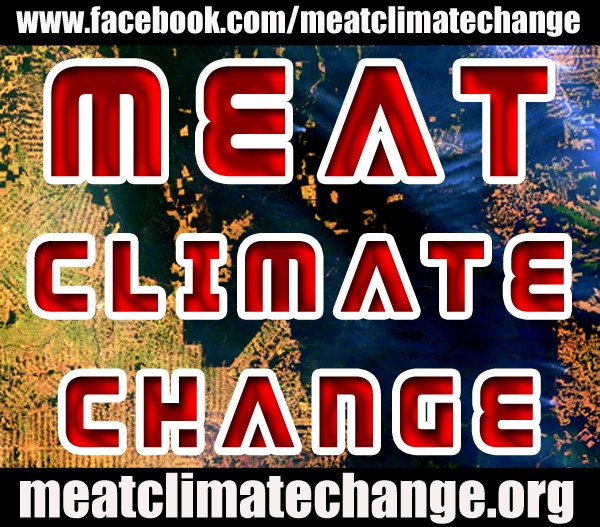Animal agriculture specifically drives climate change, and is linked to increasing greenhouse gases (GHGs), the food crisis and water emergencies. Animal agribusiness has large footprints on the air, land, water, energy, material, health, and other areas. These various GHG footprints are part of livestock animals' life-cycle and byproducts' supply chains.
Alarmingly, livestock production's footprints include carbon dioxide (CO2), methane (CH4), nitrous oxide (N2O) and other GHGs, that have a larger cumulative effect on climate change than from each gas added up individually. And unless livestock's emissions are reduced along with fossil fuels, they may set in motion various environmental feedbacks that result in the surpassing of climate change tipping points.
In reducing fossil-based emissions, an argument can be made that fossil fuels are not essential for human survival, and that many non-carbon sources of energy already exist, and should be used instead. However, this argument is often inverted when dealing with livestock's GHG emissions. Animal-based diets are viewed as non-negotiable and indispensable to human survival. And, the common perception is that other protein sources are not as good or available.
The lobbies for eggs, cow's milk and animal carcass production, are well-organized, and many politicians minimize and ignore the climate and diet issue due to conflicts of interest. For example, a European Parliament member minimized this issue by saying, "I don't believe that the world will come to an end because of cows burping and farting."
And, a senior member of the staff of the German Environment Minister admitted, "We have exempted agriculture from the climate protection strategy in order to limit the number of potential sources of conflict." The chairman of the German Advisory Council on the Environment was more explicit in stating, "No one dares to say that we ought to eat less meat and more plant-based protein."
In contrast, a World Bank study on the consumption of animal products and the risk of chronic diseases found that in many situations, the partial displacement of carbohydrate staple source of energy with animal products may have neutral or no beneficial health effect. Red meat consumption is on the rise globally, and it is associated with an increased risk of total, cardiovascular disease, and cancer mortality. In contrast, substitution of other healthy protein sources for red meat is associated with a lower mortality risk.
Similar to pollution from fossil fuels, animal-based diets cause many negative effects on human health and the environment. And, in turn, animal-based diet related illnesses and animal waste pollution generate huge amounts of CO2 emissions in health care and habitat restoration. Both fossil-based and animal-based emissions and pollution are huge problems, and regulations need to be used and strictly enforced in order to reduce risks to the environment and human health.
Reducing emissions from livestock could curb global warming fairly rapidly. By making our food system more efficient and by eating healthier food, we can reduce emissions from agriculture by up to 90 percent by 2030. That is the equivalent of removing all the cars in the world. Governments have used laws, regulations and other tools with great success to discourage smoking and other negative personal habits. Similarly, they can encourage citizens to eat a balanced diet for improved health and to help stop global warming.
Excerpt from the book, "Meat Climate Change," see http://meatclimatechange.org/
Dr. Moses Seenarine is a plant-based father and activist, founder of Climate Change 911, and the author of Voices from the Subaltern (2004), and Meat Climate Change (forthcoming).






